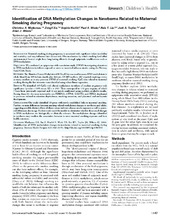| dc.contributor.author | Markunas, Christina A | en_US |
| dc.contributor.author | Xu, Zongli | en_US |
| dc.contributor.author | Harlid, Sophia | en_US |
| dc.contributor.author | Wade, Paul A. | en_US |
| dc.contributor.author | Lie, Rolv Terje | en_US |
| dc.contributor.author | Taylor, Jack A. | en_US |
| dc.contributor.author | Wilcox, Allen James | en_US |
| dc.date.accessioned | 2014-12-23T10:09:04Z | |
| dc.date.available | 2014-12-23T10:09:04Z | |
| dc.date.issued | 2014-10-01 | eng |
| dc.identifier.issn | 0091-6765 | |
| dc.identifier.uri | https://hdl.handle.net/1956/9024 | |
| dc.description.abstract | Background: Maternal smoking during pregnancy is associated with significant infant morbidity and mortality, and may influence later disease risk. One mechanism by which smoking (and other environmental factors) might have long-lasting effects is through epigenetic modifications such as DNA methylation. Objectives: We conducted an epigenome-wide association study (EWAS) investigating alterations in DNA methylation in infants exposed in utero to maternal tobacco smoke, using the Norway Facial Clefts Study. Methods: The Illumina HumanMethylation450 BeadChip was used to assess DNA methylation in whole blood from 889 infants shortly after delivery. Of 889 mothers, 287 reported smoking—twice as many smokers as in any previous EWAS of maternal smoking. CpG sites related to maternal smoking during the first trimester were identified using robust linear regression. Results: We identified 185 CpGs with altered methylation in infants of smokers at genome-wide significance (q-value < 0.05; mean Δβ = ± 2%). These correspond to 110 gene regions, of which 7 have been previously reported and 10 are newly confirmed using publicly available results. Among these 10, the most noteworthy are FRMD4A, ATP9A, GALNT2, and MEG3, implicated in processes related to nicotine dependence, smoking cessation, and placental and embryonic development. Conclusions: Our study identified 10 genes with newly established links to maternal smoking. Further, we note differences between smoking-related methylation changes in newborns and adults, suggesting possible distinct effects of direct versus indirect tobacco smoke exposure as well as potential differences due to age. Further work would be needed to determine whether these small changes in DNA methylation are biologically or clinically relevant. The methylation changes identified in newborns may mediate the association between in utero maternal smoking exposure and later health outcomes. | en_US |
| dc.language.iso | eng | eng |
| dc.publisher | National Institute of Environmental Health Sciences | eng |
| dc.title | Identification of DNA methylation changes in newborns related to maternal smoking during pregnancy | en_US |
| dc.type | Peer reviewed | |
| dc.type | Journal article | |
| dc.date.updated | 2014-12-23T10:02:43Z | |
| dc.description.version | publishedVersion | en_US |
| dc.rights.holder | EHP is a publication of the U.S. Federal Government, and its content lies in the public domain. No permission is required to reuse EHP content. However, use of materials published in EHP should be acknowledged (for example, “Reproduced from Environmental Health Perspectives”) and a link provided to the article from which the material was reproduced. | |
| dc.identifier.doi | https://doi.org/10.1289/ehp.1307892 | |
| dc.identifier.cristin | 1188406 | |
| dc.source.journal | Environmental Health Perspectives | |
| dc.source.40 | 122 | |
| dc.source.14 | 10 | |
| dc.source.pagenumber | 1147-1153 | |
